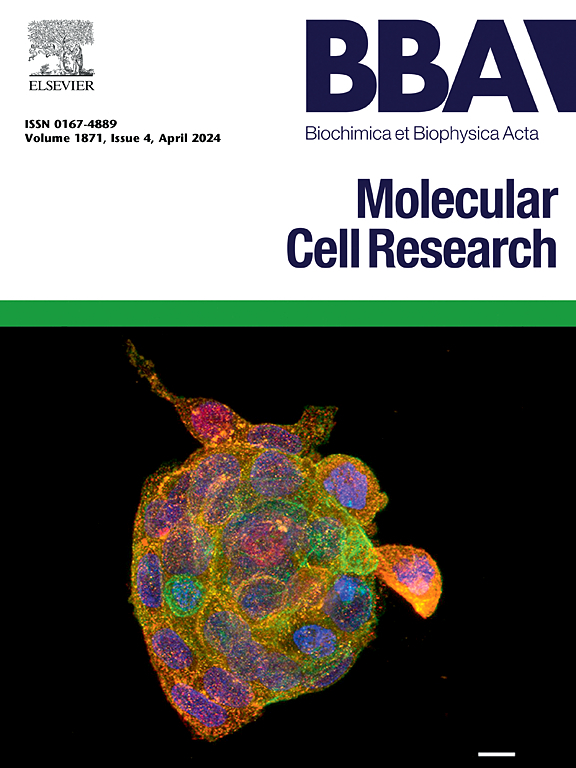Microbial chaperonin 60 inhibits osteoclast differentiation by interfering with RANK/RANKL binding and overexpression of lipocalin2
IF 4.6
2区 生物学
Q1 BIOCHEMISTRY & MOLECULAR BIOLOGY
Biochimica et biophysica acta. Molecular cell research
Pub Date : 2024-09-19
DOI:10.1016/j.bbamcr.2024.119850
引用次数: 0
Abstract
Osteoclasts play a crucial role in bone destruction in rheumatoid arthritis (RA). This study aimed to investigate the inhibitory effects of chaperonin 60 (CPN60), identified in the surface proteins of Propionibacterium freudenreichii MJ2, on receptor activator of nuclear factor kappa-B ligand (RANKL)-induced osteoclast differentiation, and elucidate the underlying mechanisms. Treatment with CPN60 inhibited RANKL-induced osteoclast differentiation by decreasing the expression of osteoclast differentiation-related genes and proteins. CPN60 interfered with the binding of RANKL to RANK, as elucidated using surface plasmon resonance (SPR) and immunofluorescence. In silico molecular docking analysis further supported the interference of CPN60 with the binding of RANKL and RANK. CPN60 suppressed the expression of molecules linked to the calcium-dependent pathway in RANKL-induced osteoclast differentiation at both mRNA and protein levels. Microarray analysis showed elevated expression of lipocalin 2 (Lcn2), which was closely linked to the inhibition of osteoclast differentiation in CPN60-treated RAW 264.7 cells. Inhibition of Lcn2 decreased the inhibitory effect of CPN60 on osteoclast differentiation, indicating that increased expression of Lcn2 by CPN60 contributes to the inhibition of osteoclastogenesis. In addition, CPN60 treatment alleviated arthritis symptoms in collagen-induced arthritis mice by reducing the generation of collagen-specific antibodies and inhibiting osteoclast differentiation. In conclusion, CPN60 of P. freudenreichii MJ2 interfered with RANKL–RANK binding, reduced the expression of genes and proteins related to osteoclast differentiation and upregulated Lcn2 expression, thereby inhibiting RANKL-induced osteoclast differentiation, which might contribute to ameliorate collagen-induced arthritis.
微生物伴侣素 60 可通过干扰 RANK/RANKL 结合和脂钙蛋白 2 的过表达来抑制破骨细胞分化。
破骨细胞在类风湿性关节炎(RA)的骨质破坏中起着至关重要的作用。本研究的目的是研究在丙酸芽孢杆菌 MJ2 表面蛋白中发现的合子素 60(CPN60)对核因子卡巴-B 配体受体激活剂(RANKL)诱导的破骨细胞分化的抑制作用,并阐明其潜在机制。CPN60 通过降低破骨细胞分化相关基因和蛋白的表达,抑制了 RANKL 诱导的破骨细胞分化。CPN60 干扰了 RANKL 与 RANK 的结合,这一点通过表面等离子体共振(SPR)和免疫荧光得到了阐明。硅学分子对接分析进一步证实了 CPN60 对 RANKL 和 RANK 结合的干扰作用。CPN60 在 mRNA 和蛋白质水平上抑制了 RANKL 诱导的破骨细胞分化过程中与钙依赖途径相关的分子的表达。微阵列分析显示,在 CPN60 处理的 RAW 264.7 细胞中,脂钙蛋白 2(Lcn2)的表达升高,这与破骨细胞分化的抑制密切相关。抑制 Lcn2 会降低 CPN60 对破骨细胞分化的抑制作用,这表明 CPN60 增加 Lcn2 的表达有助于抑制破骨细胞的生成。此外,通过减少胶原特异性抗体的产生和抑制破骨细胞的分化,CPN60 治疗可减轻胶原诱导的关节炎小鼠的关节炎症状。总之,P. freudenreichii MJ2的CPN60干扰了RANKL-RANK的结合,降低了破骨细胞分化相关基因和蛋白的表达,并上调了Lcn2的表达,从而抑制了RANKL诱导的破骨细胞分化,这可能有助于改善胶原蛋白诱导的关节炎。
本文章由计算机程序翻译,如有差异,请以英文原文为准。
求助全文
约1分钟内获得全文
求助全文
来源期刊
CiteScore
10.00
自引率
2.00%
发文量
151
审稿时长
44 days
期刊介绍:
BBA Molecular Cell Research focuses on understanding the mechanisms of cellular processes at the molecular level. These include aspects of cellular signaling, signal transduction, cell cycle, apoptosis, intracellular trafficking, secretory and endocytic pathways, biogenesis of cell organelles, cytoskeletal structures, cellular interactions, cell/tissue differentiation and cellular enzymology. Also included are studies at the interface between Cell Biology and Biophysics which apply for example novel imaging methods for characterizing cellular processes.

 求助内容:
求助内容: 应助结果提醒方式:
应助结果提醒方式:


